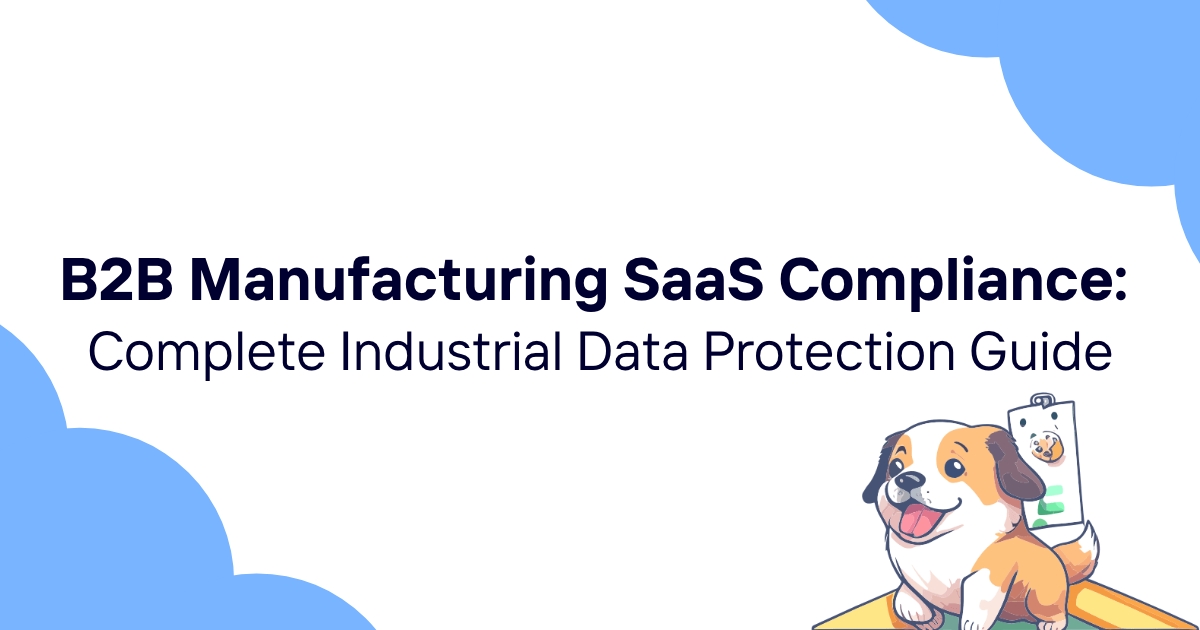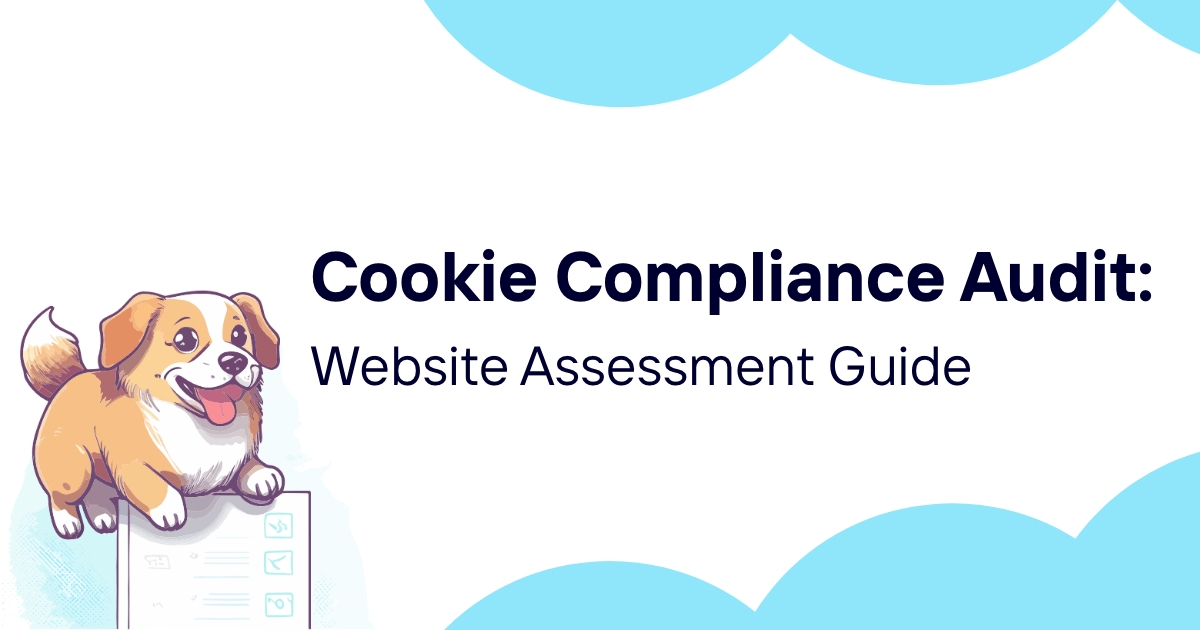Manufacturing SaaS platforms handle a unique blend of personal and business data that creates complex compliance challenges. You're processing employee information, supplier contacts, customer details, and operational data that flows through supply chains spanning multiple countries and regulatory jurisdictions.
The industrial context adds layers of complexity that consumer-focused privacy guides don't address. Manufacturing data often involves trade secrets, supplier relationships, and production information that requires protection beyond standard privacy compliance. When personal data mixes with proprietary manufacturing processes, you need frameworks that protect both privacy rights and business interests.
B2B manufacturing operates in highly regulated environments where compliance failures can shut down production lines, void supplier contracts, and trigger regulatory investigations. A data breach at a manufacturing SaaS provider doesn't just affect privacy - it can disrupt entire supply chains and expose sensitive operational information to competitors.
Manufacturing SaaS companies that build robust data protection programs turn compliance into a competitive advantage. They win more enterprise deals by demonstrating security practices that protect both personal data and industrial secrets. ComplyDog helps manufacturing SaaS platforms showcase their commitment to data protection through comprehensive compliance portals that build trust with industrial customers.
Manufacturing SaaS Data Protection Overview
Manufacturing SaaS platforms operate in complex regulatory environments where privacy laws intersect with industry-specific requirements, trade regulations, and business confidentiality needs.
Core Data Types in Manufacturing SaaS:
- Employee data - Worker information, safety records, training certifications, performance metrics
- Supplier and vendor data - Contact information, certifications, performance records, financial data
- Customer data - Contact details, order history, specification requirements, delivery preferences
- Production data - Process parameters, quality measurements, equipment performance, batch records
- Supply chain data - Logistics information, inventory levels, delivery schedules, tracking data
Each data category requires different protection levels and compliance approaches. Employee data falls under employment privacy laws, while supplier information might involve business confidentiality agreements. Customer data needs privacy protection, but production data might be protected as trade secrets.
Regulatory Framework Complexity:
Manufacturing SaaS compliance involves multiple overlapping frameworks:
- Privacy laws - GDPR, CCPA, and other personal data protection regulations
- Industry regulations - FDA for pharmaceuticals, automotive safety standards, food safety requirements
- Trade regulations - Export controls, customs requirements, supply chain due diligence
- Environmental regulations - Waste tracking, emissions reporting, chemical handling requirements
The challenge lies in building systems that satisfy all applicable requirements without creating operational inefficiencies or conflicting compliance obligations.
International Supply Chain Considerations:
Modern manufacturing involves global supply chains where data flows across multiple jurisdictions with different privacy and security requirements. A single product might involve suppliers from dozens of countries, each creating potential compliance obligations.
Map your data flows across the entire supply chain ecosystem to understand which jurisdictions apply to different types of data processing. Consider how privacy requirements in one country might affect manufacturing operations in another.
Business Confidentiality vs Privacy:
Manufacturing data often involves trade secrets, proprietary processes, and competitive intelligence that requires protection beyond privacy compliance. However, when personal data is embedded in confidential business information, privacy rights can conflict with confidentiality obligations.
Develop frameworks that protect both personal privacy and business confidentiality. Consider technical approaches like differential privacy or aggregation that can provide business insights while protecting individual privacy.
For insights on handling complex stakeholder relationships, check out our marketing SaaS compliance guide which addresses similar multi-party data sharing challenges.
Supply Chain Management SaaS Privacy
Supply chain management platforms process personal data from suppliers, logistics providers, and manufacturing partners across global networks. This creates complex privacy compliance scenarios that traditional business-to-consumer frameworks don't address.
Supplier Contact Data Management:
Supply chain platforms collect extensive contact information from supplier employees, including names, email addresses, phone numbers, and role information. This personal data requires privacy protection even in B2B contexts.
Implement data minimization practices that collect only supplier contact information necessary for business operations. A purchasing system might need primary contacts and backup personnel, but doesn't need comprehensive employee directories from supplier organizations.
Cross-Border Data Sharing:
Supply chain operations inherently involve international data transfers as information flows between manufacturers, suppliers, logistics providers, and customers across different countries and regulatory jurisdictions.
Document international data transfer mechanisms and ensure appropriate safeguards are in place for each jurisdiction. Standard contractual clauses, adequacy decisions, or binding corporate rules might be necessary depending on the countries involved.
Vendor Due Diligence Data:
Supply chain management often involves collecting personal data about supplier employees as part of due diligence, compliance verification, and certification processes. This data might include background check information, training certifications, and compliance attestations.
Establish clear legal basis and retention policies for due diligence data collection. Document the business necessity for collecting personal information about supplier employees and implement appropriate security controls for this sensitive data.
Logistics and Tracking Privacy:
Supply chain tracking systems often collect personal data through delivery confirmations, signature captures, and location tracking. This information requires privacy protection while supporting legitimate supply chain visibility needs.
Consider privacy-preserving tracking approaches that provide supply chain visibility without exposing unnecessary personal details. Delivery confirmation might require a signature, but detailed location tracking of delivery personnel might not be necessary.
Industrial IoT and SaaS Data Compliance
Industrial Internet of Things (IoT) systems generate massive amounts of data that can include personal information from workers, visitors, and others who interact with manufacturing facilities. This data requires careful privacy compliance planning.
Worker Monitoring and Privacy:
Industrial IoT systems often monitor worker movements, equipment interactions, and performance metrics for safety and efficiency purposes. This monitoring can collect personal data that requires privacy protection under employment and general privacy laws.
Implement worker monitoring systems that balance legitimate safety and efficiency needs with privacy rights. Clear policies about monitoring purposes, data retention, and worker access rights help maintain compliance while supporting operational objectives.
Biometric Data in Manufacturing:
Manufacturing facilities increasingly use biometric systems for access control, time tracking, and safety monitoring. Biometric data receives special protection under privacy laws because of its sensitive nature and inability to change if compromised.
Design biometric systems with enhanced privacy protections including encryption, access controls, and minimal data retention. Consider whether alternative authentication methods could meet security needs without processing biometric information.
Environmental and Safety Monitoring:
IoT sensors that monitor environmental conditions, safety compliance, and regulatory requirements might indirectly collect personal data through location tracking, activity monitoring, or incident recording.
Evaluate environmental monitoring systems for privacy implications and implement appropriate controls when personal data is involved. Safety incident reporting might require personal information, but routine environmental monitoring typically shouldn't.
Data Aggregation and Anonymization:
Industrial IoT systems often benefit from data aggregation and analysis that can be performed on anonymized or pseudonymized data rather than personal information. These approaches can provide operational insights while reducing privacy compliance complexity.
Implement aggregation and anonymization techniques that preserve analytical value while protecting individual privacy. Production efficiency analysis might rely on aggregated metrics rather than individual worker performance tracking.
Manufacturing Customer Data Rights
Manufacturing SaaS platforms often process customer data in B2B contexts where individual privacy rights must be balanced with business relationship needs and contractual obligations.
B2B Customer Contact Management:
Manufacturing customer data typically includes contact information for purchasing, engineering, quality, and logistics personnel at customer organizations. This personal data requires privacy protection even within business relationships.
Implement customer contact management systems that respect individual privacy rights while supporting business relationship needs. Customers should be able to update their contact preferences and control how their information is used for different business purposes.
Technical Specification Privacy:
Customer technical specifications and requirements might include personal information when they relate to specific personnel, custom requirements, or proprietary processes developed by individuals.
Design specification management systems that can separate personal information from technical requirements. Consider whether customer specifications require personal data or whether role-based information would meet business needs.
Customer Access and Portability:
B2B customers might request access to their personal data or data portability for business continuity purposes. These requests need to be handled carefully to provide appropriate access while protecting business confidential information.
Develop customer data access procedures that can provide personal information while protecting confidential business data, proprietary processes, and other customers' information that might be stored in the same systems.
Retention for Business Relationships:
Manufacturing customer relationships often span years or decades, creating data retention challenges when business relationships end but legal or contractual obligations require maintaining certain records.
Implement retention policies that consider the lifecycle of manufacturing business relationships, contractual obligations, and regulatory requirements while respecting privacy data minimization principles.
B2B Manufacturing SaaS Vendor Management
Manufacturing organizations require extensive vendor compliance documentation to meet their own regulatory obligations and risk management requirements. SaaS vendors must be prepared to support these heightened compliance expectations.
Regulatory Compliance Documentation:
Manufacturing customers often operate in highly regulated industries that require extensive vendor compliance documentation. Prepare comprehensive vendor packages that address common regulatory requirements across different manufacturing sectors.
Include industry-specific compliance information such as FDA validation support for pharmaceutical manufacturing, automotive quality standards for automotive suppliers, or food safety compliance for food manufacturers.
Supply Chain Security Requirements:
Manufacturing customers increasingly require vendors to demonstrate supply chain security practices that protect against disruption, contamination, and compromise. These requirements go beyond standard information security to address operational continuity.
Document your business continuity planning, disaster recovery capabilities, and supply chain risk management practices. Manufacturing customers need assurance that SaaS vendor issues won't disrupt their production operations.
Audit and Certification Support:
Manufacturing organizations undergo regular audits for quality, safety, environmental, and regulatory compliance. These audits often include vendor assessments that require SaaS providers to demonstrate their compliance practices.
Prepare audit support packages that address common manufacturing compliance frameworks. Consider obtaining relevant certifications like ISO 9001, ISO 14001, or industry-specific standards that manufacturing customers recognize.
Data Processing Agreements for Manufacturing:
Manufacturing customer agreements should address the unique aspects of industrial data processing, including confidentiality requirements, regulatory obligations, and business continuity needs.
Develop DPA templates that address manufacturing-specific requirements while maintaining standard privacy protections. Include provisions for regulatory inspections, quality audits, and supply chain due diligence that manufacturing customers might require.
Production Data Privacy in Manufacturing SaaS
Production data in manufacturing environments often contains personal information embedded within operational metrics, quality records, and process documentation. This data requires careful privacy analysis and protection.
Quality Management System Data:
Quality management systems track production issues, corrective actions, and continuous improvement activities that might include personal information about workers, inspectors, or quality personnel.
Implement quality management systems that can separate personal information from quality metrics and process improvements. Consider whether quality records require individual identification or whether role-based tracking would meet regulatory and business needs.
Batch and Lot Tracking:
Manufacturing batch records and lot tracking information might include personal data about production workers, quality inspectors, or supervisors involved in specific production runs.
Design batch tracking systems that balance traceability requirements with privacy protection. Regulatory traceability might require knowing which qualified personnel performed specific operations, but detailed personal information about workers might not be necessary.
Equipment and Process Monitoring:
Production equipment monitoring and process control systems might collect personal data through operator interactions, maintenance activities, or safety monitoring.
Evaluate production monitoring systems for privacy implications and implement appropriate controls when personal data is collected. Equipment maintenance records might need technician identification, but detailed behavioral monitoring might exceed business necessity.
Regulatory Reporting Requirements:
Manufacturing regulatory reporting often requires specific data about personnel qualifications, training, and activities. These requirements create legitimate business needs for collecting and retaining personal information.
Document regulatory reporting requirements that justify collecting personal information and implement retention policies that align with regulatory obligations while minimizing privacy impact.
Manufacturing Compliance Automation
Automated compliance management helps manufacturing SaaS platforms handle complex regulatory requirements while maintaining operational efficiency and data protection standards.
Compliance Monitoring Systems:
Implement automated monitoring for key compliance metrics including data retention compliance, consent management, vendor agreement status, and regulatory reporting requirements.
Automated compliance monitoring should alert management to potential issues before they become violations. Track trends over time to identify areas where compliance practices might be degrading or require additional attention.
Documentation Management:
Manufacturing compliance requires extensive documentation that must be organized, searchable, and accessible during regulatory inspections and customer audits.
Maintain centralized documentation management systems that support version control, access logging, and automated retention policies. Poor document organization can turn routine compliance activities into time-consuming manual searches.
Vendor Compliance Tracking:
Manufacturing SaaS platforms often depend on multiple vendors and service providers that must maintain compliance with industry and privacy requirements. Automated vendor tracking helps ensure ongoing compliance across the vendor ecosystem.
Track vendor certifications, agreement renewals, and compliance status changes that might affect your overall compliance posture. Automated alerts can identify vendor compliance lapses before they impact customer relationships.
Regulatory Change Management:
Manufacturing regulations change frequently, and compliance automation can help track regulatory updates and assess their impact on platform operations and customer obligations.
Implement regulatory change monitoring that identifies relevant updates and assesses their impact on your compliance program. Automated change management helps ensure compliance programs stay current with evolving requirements.
Ready to demonstrate your commitment to industrial data protection? Use ComplyDog and build trust with manufacturing customers through a comprehensive compliance portal that addresses both privacy requirements and industry-specific compliance needs.


















